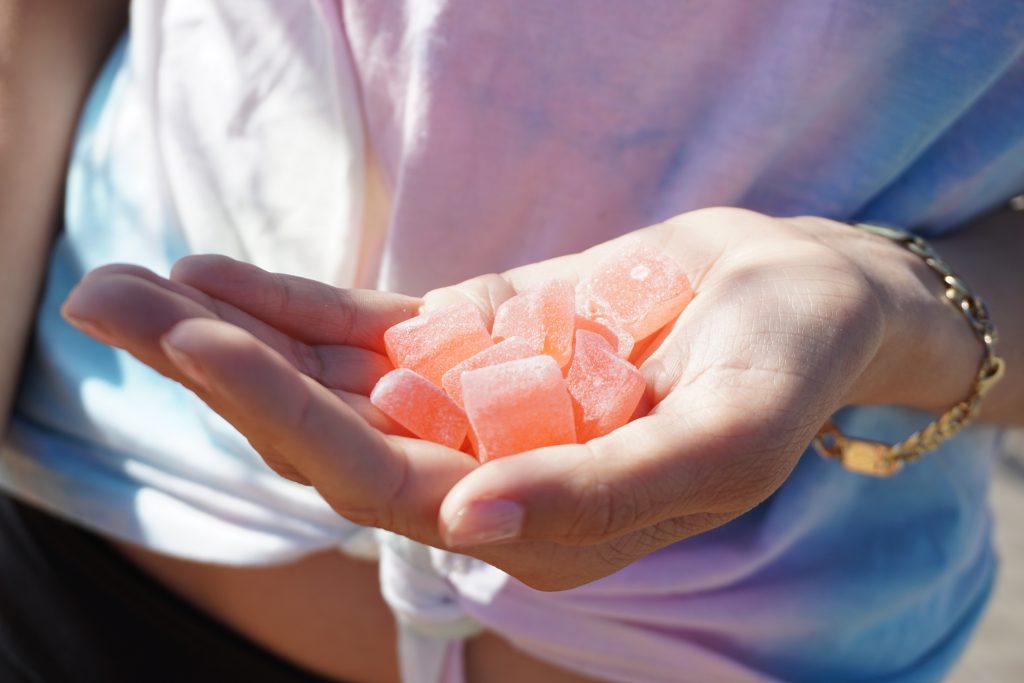You may be seeing Delta-8 products at corner stores, groceries, and upscale boutiques. Delta-8, Delta-9 and Delta-10 are all THC compounds and are commonly found in products like gummies and edibles. In this article, we will focus on Delta-8 THC. What really is Delta-8 THC, how is it made, and is it safe?
What is Delta-8-THC?
Delta-8-tetrahyrdocannabinol (Delta-8 THC) is a cannabinoid cousin of the well known Delta-9 THC (the compound responsible for the intoxicating effects of cannabis). Although the sale of Delta-8 products is on the rise, caution should be used when considering these products. A recent publication by the FDA noted, “Delta-8-THC has psychoactive and intoxicating effects and may be dangerous to consumers.”
To get to the heart of how Delta-8 is different from the well-known, Delta-9, let’s first examine how Delta-8 products are made.
How is Delta-8 made?
All cannabinoids begin their life as cannabigerolic acid (CBGA). This compound, often referred to as the mother of all cannabinoids, evolves throughout the course of the cannabis plant’s growth cycle into every natural cannabinoid known today, from THC to CBD and beyond.
Because cannabinoids are remarkably similar in molecular structure, it’s quite easy to convert from one to another, using chemicals in a lab. Technicians have been using similar conversion techniques to transform common cannabinoids into novel ones; and now, they are applying the same technology to create Delta-8 THC.
Delta-8 THC naturally exists in cannabis plants (both hemp and marijuana) but typically in extremely low quantities. Extracting and purifying Delta-8 from raw plant material with less than 1% of the targeted cannabinoid is simply too costly for manufacturers. This is why producers have started converting more common cannabinoids like cannabidiol (CBD) and delta-9 tetrahydrocannabinol (Delta-9 THC or, more commonly, THC) to Delta-8. But, this isn’t the only reason for the rise in production of Delta-8.
With a surplus of hemp-derived CBD now flooding the markets and a booming production industry, hemp producers have found themselves not only with excess CBD but excess hemp-derived Delta-9 THC as well. Both CBD and Delta-9 THC are prime candidates for conversion into Delta-8 THC.
Most Delta-8 THC products are made from hemp products, either naturally or in the lab. Since they are made from hemp, this allows these products to slip through a legal loophole, allowing intoxicating hemp-derived products to be sold without the same scrutiny and regulation that its sister cannabinoid, Delta-9 THC, receives. Due to the availability of these products and consumer demand, Delta-8 THC is more profitable than CBD these days.
The process of converting CBD into Delta-8 is nothing new. This isomerization process has been around for decades. To read more about the process, check out this article from CannabisTech.
Are Delta-8 THC products legal?

As of now, Delta-8 THC is legal in the United States.
However, out of concerns for safety, some States are bolstering their rules around these products. Utah regulators say they’re pushing for new rules to govern the presence of delta-8 THC and other synthetic cannabinoids in the state’s medical marijuana supply.
Some in the hemp industry are fighting back. Regulators in states like Texas, Kentucky and Kansas are navigating lawsuits over new restrictions. In Virginia, regulators were met with a far from welcoming response at a meeting earlier this month after they announced new restrictions on edible products.
How are Delta-8 products tested?
You probably know about the two main cannabinoids: cannabidiol (CBD) and tetrahydrocannabinol (THC). Additionally, the Cannabis sativa plant can produce hundreds of chemical entities, including minor cannabinoids, terpenes, and other chemicals. Through testing, companies can find and quantify the concentration of these substances to confirm that the quantities of CBD and THC listed on the packaging are accurate and legal.
If THC levels are too high, the product can become intoxicating. The ‘high feeling’ that we associate with the use of cannabis comes from Delta-9 THC and to a lesser degree, Delta-8 THC. As per the FDA “cannabis plants and derivatives that contain no more than 0.3 percent THC on a dry weight basis are no longer controlled substances under federal law”. But without independent testing, you have no way to verify if you are consuming higher amounts of THC than you anticipated, or if you are consuming a potentially harmful product tainted with mold, heavy metals or other environmentally toxic substances.
Curious about how to find hemp-derived CBD products and what type of CBD may be best for you? The team of medical professionals and researchers at Ashford Wellness provide consumers with clarity and confidence in choosing hemp-derived CBD products. They independently evaluate hemp-derived CBD products for more than 150 potential toxins. It is their mission to help consumers find Premium, Clean CBD products. On their website, you can check out products that pass their rigorous evaluation.
Pros and Cons of Delta-8 THC
Delta-8 is considered a “minor cannabinoid.” It is known for its less potent intoxicating effects compared to the standard Delta-9 THC found in cannabis strains, but it is still potentially intoxicating. The comparatively less mind-altering effects of Delta-8 THC may make it an attractive option for healthcare professionals and their patients, but this preference remains to be seen given the scarcity of research on Delta-8 THC compared to Delta-9 THC. One must also consider that future regulations may close the loophole on all THC synthetics like Delta-8 and Delta-10 THC.
Delta-8 THC may be more shelf-stable than other THC-rich options, which makes it potentially useful in topical creams, patches, vape cartridges, and edibles with less concern about its potency fading after a short time. However, the safety profile of synthetic Delta-8-THC is yet to be determined, and may be unsafe due to the industrial processes used to make it.
As more states legalize cannabis for recreational and medicinal use, some lawmakers are continuing to prohibit Delta-8-THC. Of the 14 states that have banned it, six allow recreational use of cannabis, 10 allow medical use and three have decriminalized recreational use. If you are interested in finding out more about how to get a medical card in Ohio or Missouri, click here.
Thanks to the 2018 U.S. Farm Bill, the sale of Delta-8-THC products was effectively legalized through a loophole. This bill allowed hemp to be sold in areas where recreational use of cannabis was prohibited, as well as where medicinal marijuana was permitted with a doctor’s recommendation. To put it simply, as long as the products are hemp-derived, they are legal. By late 2020, delta-8-THC exploded in popularity.
Despite its rapidly increasing availability, there is still a lot to learn about Delta-8-THC’s properties and effects.
Researchers from the University at Buffalo and the University of Michigan are shedding important new light on this compound. They’ve partnered with a Buffalo-based manufacturer of cannabinoid (CBD) products in order to learn more about the benefits and potential safety concerns. They hope to better inform lawmakers, public health officials, consumers and others.
The research team just published two papers based on their survey of more than 500 participants’ experiences with Delta-8-THC and how it compared to traditional marijuana. One user best described the views shared by survey participants: Delta-8-THC is like Delta-9’s “nicer younger sibling” because it provides benefits with fewer negative reactions. Again, it should be noted that Delta-8 THC can still intoxicate users. For those who are sensitive, the reaction to Delta-8 THC can be as strong as a Delta-9 THC experience. Obviously, one should refrain from driving or operating heavy machinery when using Delta-8 THC, just as one should refrain from those activities when under the influence of Delta-9 THC.
Which products should you use?
Well, that is up to you. According to some research, Delta-9 THC is the strongest; Delta-8 THC is weaker than Delta-9 THC; Delta-10 THC is weaker than Delta-8 THC. While they have a similar chemical formula, they each have a slightly different structural makeup. This causes them to produce slightly different effects on the body. Regardless, all three components have a different legal status depending on where you live. And, each component can have different effects and intensity from person to person.
According to Ashford Wellness, until more rigorous research can be conducted, synthetic products should be used with caution. There is little research available for the safety of these products, so it’s important that patients learning about the difference between Delta-8, Delta-9, and Delta-10 ultimately rely on a licensed medical professional for advice.
Summary
Although Delta-8 products are being manufactured and sold, many questions and concerns remain. Naturally-derived Delta-8 occurs in very small quantities in hemp plants. The fact that most of the products on the shelves are synthetically created and not naturally derived (like CBD), makes lawmakers, researchers, physicians wary of the potential effects.
